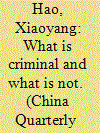| Srl | Item |
| 1 |
ID:
129447


|
|
|
|
|
| Publication |
2013.
|
| Summary/Abstract |
Notwithstanding the role that opium and narcotics have played in China's history, drug use, trafficking and other drug-related problems have been consistently condemned by the Chinese government as social vices. After being a 'drug-free' nation from the 1950s to the 1970s, drug problems resurfaced in the 1980s and China was forced to deal with such problems once again. The Chinese government is well known for its tight control over the media, and for its ability to utilize propaganda to win public support and carry out its policies. However, the Chinese government's use of the media and propaganda to deal with drug issues has never been explored. Based on longitudinal data collected from the People's Daily (from 1946 to 2009), this study examines two key issues: the ways in which the government has utilized ideology in its official stories over time, and the means through which the government has tried to re-establish its drug control in the 21st century. The data suggest that the use of 'hard-core' ideology as a tool has not only drastically declined over time but also undergone significant modifications. The Chinese government has adopted a multifaceted approach to drug control and it has managed to present a unified voice in the media in combatting drug problems.
|
|
|
|
|
|
|
|
|
|
|
|
|
|
|
|
| 2 |
ID:
121210


|
|
|
|
|
| Publication |
2013.
|
| Summary/Abstract |
Within the Chinese Communist Party (CCP), some Party units have established a largely unknown network of writing teams which propagate the policies or perspectives of a particular unit by publishing feature articles in Party journals. These writing teams often make use of a pseudonym in the form of a person's name, leading outsiders to believe that the work is written by a journalist. In fact, the pseudonyms of the Party unit writing teams function as a form of secret code. Through this code, inner Party members can recognize which unit's views an article reflects. In order to reveal exactly which units the codes represent, we have collated the names of over 20 writing teams. In addition, we provide an introduction to the functioning of the writing teams and the manner in which articles are produced. Finally, we propose that the CCP's mechanism of "propaganda codes" is gradually undergoing the process of institutionalization.
|
|
|
|
|
|
|
|
|
|
|
|
|
|
|
|
| 3 |
ID:
173860


|
|
|
|
|
| Summary/Abstract |
The Chinese Communist Party (CCP) prosecuted Japanese military servicemen for war crimes committed during and after the Sino-Japanese War. This paper examines written confessions left by those Japanese war crimes suspects and considers to what extent they were used by the CCP to prosecute sexual violence during the trials. The historical analysis is contextualized by an examination of the representation of the CCP's legal approach to sexual violence in articles from the People's Daily. This paper finds that although accounts of sexual violence are found in the confessions written by suspected Japanese war criminals, the courts did not make rape a focal point of the prosecutions and did not pursue the so-called “comfort women” issue. Furthermore, no victim of rape was called to testify before the court. The CCP's approach to the issue of sexual violence in the 1956 trials closely corresponded to the discourse and propaganda in the People's Daily.
|
|
|
|
|
|
|
|
|
|
|
|
|
|
|
|